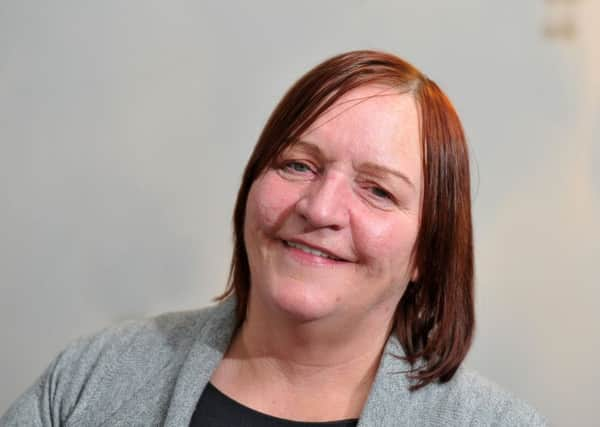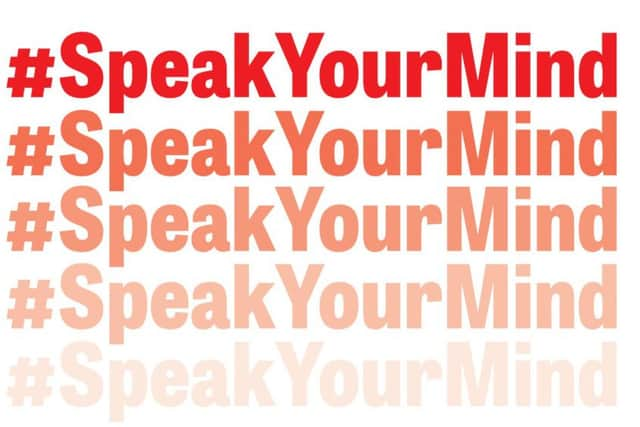#SPEAKYOURMIND: Leeds mum-of-six Bev opens up about post-natal despression


But for some new parents, the hours and days that follow child birth can be among their darkest.
Leeds mum-of-six Bev Thornton knows how hard those days can be - after she was diagnosed with post-natal depression following the birth of her first child, aged 26.
Advertisement
Hide AdAdvertisement
Hide Ad“I got the ‘blues’, as they call it, the ‘baby blues’,” Bev told the Yorkshire Evening Post.


“I got it really, really bad. I was so depressed. I had no motivation.
“I bonded with my child but some people don’t even do that, they kind of reject the child - it’s not their own doing it’s just the chemistry.
“They said it was a hormone inbalance and that I would get over it - but I didn’t.”
Advertisement
Hide AdAdvertisement
Hide AdBev has grappled with mental health issues for more than 30 years since that first diagnosis, and now works for the NHS in Leeds using her experiences to help encourage people to express their views and shape the service for others.


She is today bravely sharing her experiences as part of the YEP’s #SpeakYourMind campaign.
After being on anti-depressant medication for six months, she stabilised and was managing until the birth of her second child, three years later, and was diagnosed with manic depression - now known as bipolar.
“I accepted it because I looked it up and it made sense,” Bev says.
Advertisement
Hide AdAdvertisement
Hide Ad“It fitted the traits and I could relate to it. It affected others more because I lost a lot of friends, my family kind of judged me too much.
“People thought ‘she’s not right in the head, keep away’, ‘it’s contagious’ and ‘it’s dangerous, unreliable’ - which I wasn’t, I was always very reliable.
“So I lost a lot of friends but then, were they really friends? No, they weren’t.”
The single mum, who was born in Huddersfield, moved to Leeds as a child when her father got a job working at HM Prison in Armley.
Advertisement
Hide AdAdvertisement
Hide AdShe now attributes a lot of her mental health issues to her childhood.
“When you have your own kids, especially, you think back to your childhood and when I look back things weren’t right,” Bev says.
“My environment wasn’t right, my social circumstances; the things that were around me. And God knows how I managed to get through it, but I did.
“Both my parents were heavily dependent on alcohol, it was a very abusive family set-up. My father was a prison officer at Armley, and he used to come back and rule the house with his truncheon.
“I was in the firing line, being the only child.
Advertisement
Hide AdAdvertisement
Hide Ad“People used to think you’d get everything you want - materialistically yes I did, but I didn’t get what I really needed which was love. So I had a pretty bad childhood, quite abusive, physically and mentally, and I think when I ended up having my first child it all came back and I realised a lot of my issues related back to what was happening to me as a child.”
Bipolar affects people’s moods, which can swing from one extreme to another, and they experience periods of ‘highs’ and ‘lows’ - or depression.
Bev held down a full-time job, working for the Citizen’s Advice Bureau, while living with bipolar and raising her children as a single parent.
But her life reached breaking point when her fourth pregnancy ended in a stillbirth.
Advertisement
Hide AdAdvertisement
Hide AdAfter losing baby Fana, Bev had a psychotic episode and tried to take her own life.
“When I lost my child that was the only time I’ve ever tried to commit suicide, and did attempt it,” she says.
“I got a really bad psychotic episode, convinced I was evil and I tried to kill myself.
“Obviously it didn’t work and on reflection it was a selfish act because I had got three children, who needed me. But at the time the psychotic images, the visions, were so real that I was trying to run away from them.
Advertisement
Hide AdAdvertisement
Hide Ad“I haven’t done it since and I would never because my kids are my protective factor. I love them all dearly.”
Doctors prescribed her more medication and Bev has since had two more successful pregnancies.
Now 56, she knows the triggers for her ‘high’ and ‘low’ mood swings, and is a valued member of staff at the Leeds and York Partnership NHS Trust whose insight helps decision-makers improve services they provide in the city.
She wants to help dispel myths and labels associated with mental health conditions like bipolar, and combat the social stigma surrounding the issue as part of the YEP’s #SpeakYourMind campaign.
Advertisement
Hide AdAdvertisement
Hide Ad“I’m in a good place now because it’s not about what I can’t do, now it’s about what I can do,” Bev says.
“What’s my ability? Who am I? What am I made up of?
“It’s not just ‘a bipolar person’, I’m creative, I’m artistic, I love music, I’m into football - I’m into this, that and the other so it’s kind of defining who I am.
“I now am fully aware of my warning signs - my triggers and early warning symptoms - which I never used to be, so I know if it’s coming back. If I’m getting low or I’m getting high, and I know what to do.
“It’s about conditioning your mind to live and enjoy every moment as you can, but to be aware that when things are going wrong you need to get help before it reaches a crisis.”
Advertisement
Hide AdAdvertisement
Hide AdShe says that a strong family support network and group or talking therapy sessions can help people cope with mental health issues, accept and overcome them.
Bev is chairwoman of the NHS trust’s Service User Network (SUN), and works closely with people who access mental health and learning disability services in Leeds.
Members of the network - who can be NHS staff or patients - are given the opportunity to share and listen to the experience of others, highlighting areas of concern or areas where improvements to services across the city could be made.
Susan Tyler, director of workforce development at Leeds and York Partnership NHS Foundation Trust, said: “Bev is a highly valued member of our team and by sharing her story is an inspiration to others.
Advertisement
Hide AdAdvertisement
Hide Ad“It’s really important that as a trust we employ and learn from people with lived experience of mental health conditions. Their insight helps us to continually improve the services we provide to those who need us, locally, regionally and nationally.”